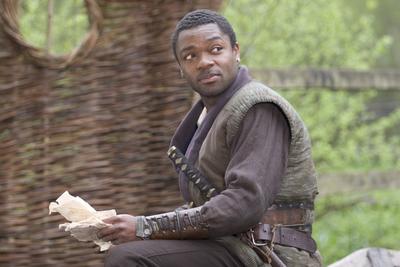No lies, this is my favorite of all the plays we've read so far. I'm a sucker for the fantastical, the dark, the mysterious and mythilogical (think Tim Burton, i.e. my hero) and this really does it all for me. I am absolutely ecstatic about getting to see this on Saturday, and am hoping the visuals live up to my expectations. The rich, murky palette is a refreshing contrast to my previous read, As You Like It. Long twisted shadows, streaming moonlight, gritty textures, gnarled trees and dark uncertainty. . . What can I say. . . I'm twisted.
Visuals alone do not a production make, however (as I sit listening to Hans Zimmers brilliant soundtrack to Inception. . .let's not even talk about how brilliant that movie was). There are a miriad of references to noises and music in this play; for example:
 (III.ii.135)
(III.ii.135)Caliban:
Be not afeard: the isle is full of noises,
Sounds and sweet airs that give delight and hurt not.
Sometimes a thousand twangling instruments
Will hum about mine ears; and sometimes voices
That, if I then had waked after long sleep,
Will make me sleep again; and then, in dreaming
The clouds methought would open and show riches
Ready to drop upon me, that, when I waked,
I cried to dream again
 |
| Someone explain to me why I never heard about this??? It was out just last year! |
Ferdinand:
Where should this music be? i' the air or the earth?
It sounds no more: and sure, it waits upon
Some god o' the island. Sitting on a bank,
Weeping again the king my father's wreck,
This music crept by me upon the waters,
Allaying both their fury and my passion
With its sweet air: thence I have follow'd it,
Or it hath drawn me rather. But 'tis gone.
No, it begins again.
This play is full of mention of music; "solemn and strange" music (as at the magical feast), "sweet airs" . . . not to mention, music follows Ariel - a mythological, spritely creature - wherever he goes. It was a device for leading Ferdinand to Miranda, as well as waking the men before Antonio and Sebastian had the chance to kill Alonso.
Music and enchantment are eternally intertwined and inseperable. As we discussed in class, Romance (more in the sense of fantasy and the supernatural) is often heavily associated with music (and vice versa) because of its irrational, whimsical qualities.
I also feel strongly because of my time as a sound technician for shows in high school. Sounds and music can really have a strong impact on the tone and atmosphere. So, I decided to choose some (royalty free) music that I would implement into the sound design for The Tempest if I were staging it.
Royalty Free Music by Kevin Macleod, http://incompetech.com/m/c/royalty-free/




